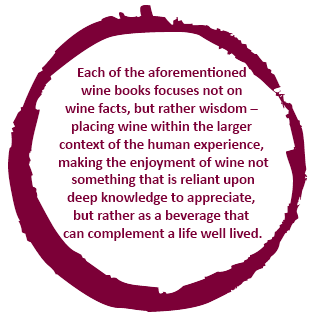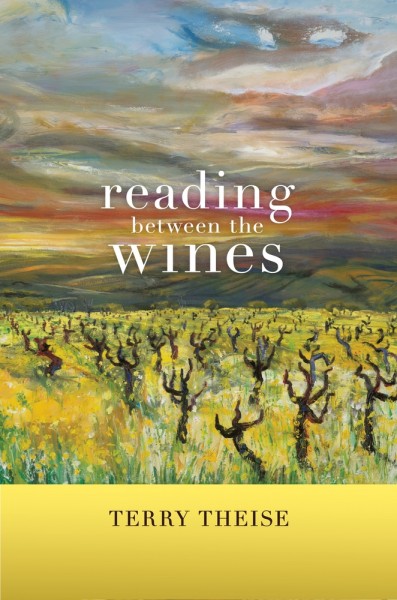It’s a tough question to answer and it is a question that pierces straight through into our subconscious where answers are elusive.
 Yet, you should have an answer to the question.
Yet, you should have an answer to the question.
Anybody interested in wine that searches out information (online or otherwise) is inundated with an incomprehensible array of facts and opinions from a variety of sources, this writer included. But what is the true purpose of our quest to read, write, learn and share about matters of the grape?
In psychological terms, are we seeking a variant of Maslow’s hierarchy of needs? Is it self-actualization in our wine journey, a sort of “at-peace” resting state comfortable in the fulfillment of our vinous potential?
In metaphysical terms, are we searching for enlightenment—the state of acquiring enough information-turned-wisdom to be able to question accepted doctrine?
If the quest to slake our interest in wine is based on gaining comfort in our own proverbial wine skin, then wine marketers have it all wrong.
For years, wine marketers have built wine appreciation up as a subject that requires deep knowledge: history, countries, styles, grape varietals, tasting descriptors, food pairings, geography and other bits of esoterica that have everything to do with the acquisition of knowledge, but very little to do with understanding—and with nearly nothing in common with wisdom or with enlightenment, that nirvana-like state of clarity.
If you don’t believe me, go shop for a wine book and tell me what your choices are. Eight out of ten will be focused on wine facts and information. Encyclopedic tomes will dominate and precious few books will place wine within a holistic context.
This is part of the reason (if not the principal reason), why the numbers of the “wine-interested” are legion, halted by a forbidding barrier to entry while the “wine enlightened” represent a much smaller percentage of people.
Who has time to get the equivalent of a Ph.D. degree just to savor a glass of wine?
Yet, that doesn’t mean the merely wine-interested can’t carve their own abbreviated educational path that is less memorization and more personal reconciliation, making a journey towards an appreciation of wine that helps us self-actualize.
This is where Terry Theise’ 2010 book, Reading Between the Wines(paperback, October 2011) comes into play, joining Lawrence Osborne’s The Accidental Connoisseur (2005) and Matt Kramer’s Making Sense of Wine (revised edition, 2004) on the thoughtful wine enthusiasts’ bookshelf, a trinity of modern wine books with meaning.
They’re sort of a Viktor Frankl, M. Scott Peck, Napoleon Hill-like non-ecclesiastical triage for tipplers.
Each of the aforementioned wine books focuses not on wine facts, but rather wisdom—placing wine within the larger context of the human experience, making the enjoyment of wine not something that is reliant upon deep knowledge to appreciate, talking about wine as a beverage that can complement a life well lived.
Taking the most recent author as an example, for his part, Theise is a wine importer of repute who is focused on small, artisanal wines from Germany and Austria as well as small production Champagne from France, and he offers a substantive but unadorned view of wine, free of the pretense that makes modern marketers (to say nothing of wine connoisseurs) boorish by perception.
 It’s easy to lose yourself in the theatre of your mind in the briskly paced Reading Between the Wines. The imaginary author is sitting across a table from you in an old row house in a hardscrabble town somewhere in the Rustbelt and explaining his philosophy on wine—and by proxy—life. The education is just getting started when he reads a passage aloud from the first few pages of his book noting, “Confected wines are not designed for human beings; they are designed for ‘consumers.’ Which do you want to be?” Your defenses removed, he punches you in the gut and puts a warm arm around your shoulder, stage whispering reassuringly that there is still time for you to see the light; there is hope if only you’d lose the preconception of wine as something more than inherent truth in the bottle and certainly not an artifice of knowledge as lifestyle totem.
It’s easy to lose yourself in the theatre of your mind in the briskly paced Reading Between the Wines. The imaginary author is sitting across a table from you in an old row house in a hardscrabble town somewhere in the Rustbelt and explaining his philosophy on wine—and by proxy—life. The education is just getting started when he reads a passage aloud from the first few pages of his book noting, “Confected wines are not designed for human beings; they are designed for ‘consumers.’ Which do you want to be?” Your defenses removed, he punches you in the gut and puts a warm arm around your shoulder, stage whispering reassuringly that there is still time for you to see the light; there is hope if only you’d lose the preconception of wine as something more than inherent truth in the bottle and certainly not an artifice of knowledge as lifestyle totem.
A few dozen pages later, Theise supplies some context, saying, “We were suburban folk, and a certain existential disconnect was a defining parameter of our experience.” He later notes, “If you’re sinking into ennui as yet another corporate type presses his marketing strategies on you, as yet another former dermatologist or veterinarian lords his milk-and-honey lifestyle over you and you wonder what any of it has to do with wine, with why you first fell in love with wine—I have places to show you.”
And, he does.
What follows between the covers of Reading Between the Wines is as thoughtful of a rumination on wine and the beauty of being human, in all of our fragility, that you are ever likely to find in a wine book, or any book for that matter.
Theise shepherds us down a meandering path of enlightenment that encompasses a practical perspective on understanding our palates, a highly subjective take on the world of wine including a set of principles for what matters in vino, an assault against the dumbing down of wine, a parenthetical reference that lasts nearly 30 pages, a vivisection of sacred cows like points scoring for wine, a carving of his Mount Rushmore of wine varietals and a discrete tour of his portfolio of wine via anecdotes.
It’s not a perfect book, no. But, then, that’s the point. Life isn’t perfect. Wine isn’t perfect. The best that we can do is create something that respects the land, engenders respect in the bottle and acts as a vehicle for enlightenment née knowledge.
Wine, in all of its glory, is an attempt to bottle nature’s attempt at perfection as captured by man and his foibles. Ultimately, the result in book form is as wine luminary Karen MacNeil says, “…the single best book I’ve ever read on why wine matters.”
Indeed.
And, even if the wine industry hasn’t learned from its past mistakes and is still focused on pushing information instead of wisdom and enlightenment, the savvy amongst the wine-inclined can short circuit a journey to wine enlightenment. Step one is answering the mercurial question just posed, “Why are you reading this?” Step two is to pick-up Theise’ Reading Between the Wines.
 A journalist by education and a technology sales and marketing professional by career, Jeff marries both as the author of the popular national wine blog Good Grape: A Wine Manifesto. Writing daily since 2006, Jeff’s contemporary and pragmatic take on the culture of wine has led to three nominations and two wins in the American Wine Blog Awards, numerous accolades, trade and consumer magazine writing credits and enough fans to consistently rank within the top tier of wine bloggers internationally. Jeff is a Palate Press Contributing Editor and columnist.
A journalist by education and a technology sales and marketing professional by career, Jeff marries both as the author of the popular national wine blog Good Grape: A Wine Manifesto. Writing daily since 2006, Jeff’s contemporary and pragmatic take on the culture of wine has led to three nominations and two wins in the American Wine Blog Awards, numerous accolades, trade and consumer magazine writing credits and enough fans to consistently rank within the top tier of wine bloggers internationally. Jeff is a Palate Press Contributing Editor and columnist.

